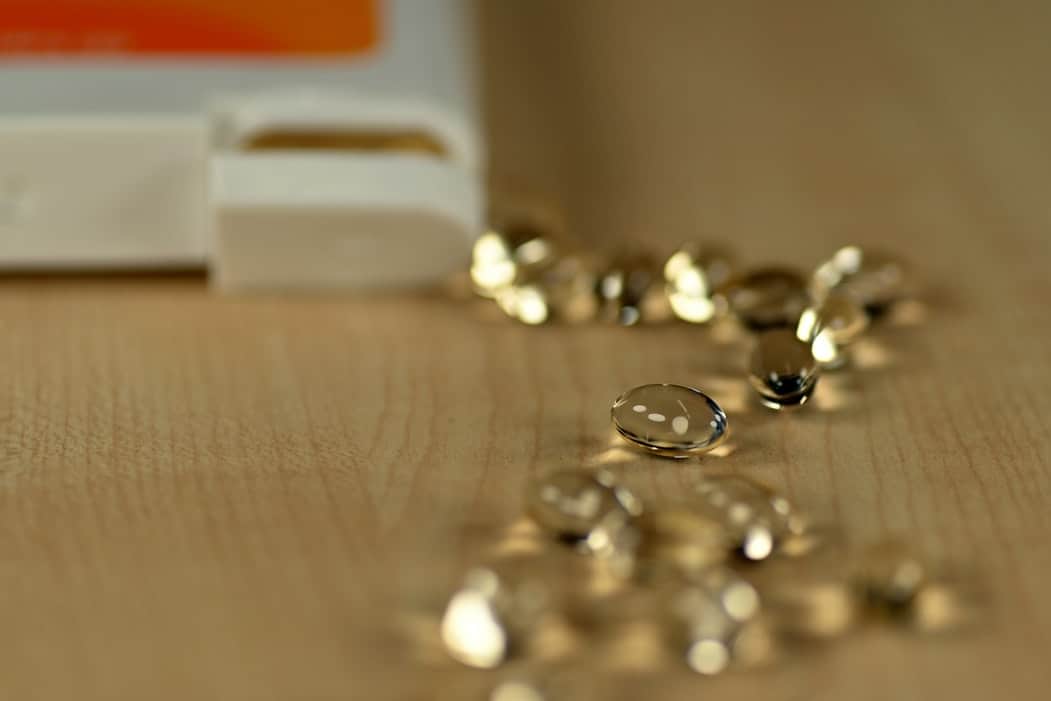Fish Oil For Hair Growth Explained

There is more to fish than beaches and aquariums! Fish oil has been gaining a lot more attention in recent times, and this is fish oil for hair growth explained.
The market is pretty much flooded with methods and techniques which claim to prevent hair loss and aid hair growth. Now, the connection between fish and hair growth is not very obvious, so I can see how some may be skeptic. I mean, fish don’t even have hair… Verily, this demands a detailed examination and explanation.
First thing’s first.
What Is Fish Oil?

Fishes swimming.
When eaten in moderation, fish are considered one of the healthiest substances you can consume. Not for naught is it considered “brain food”. Fish oil is derived from species like salmon, tuna, mackerel, and other fatty fish. Whether as part of your regular diet or a dietary supplement, it possesses many fine attributes.
Fish oil, in particular, became a very popular substance, perhaps even more than essential oils at times, because of its Omega-3 content. Omega-3 is a group of essential fatty acids which we human beings require for proper function, but cannot produce spontaneously in our bodies – hence it must be eaten or taken externally. Fish is not the only way of obtaining Omega-3, but certainly, the tastiest way to go about it!
Omega-3 is thought to help balance certain processes in the body. It can boost the immune system and reduce inflammation. It also has the potential to prevent pains brought on by arthritis, and it may even improve your visual perception. The body/mind connection makes it so when the body is healthier, and in particular the brain, there are fewer symptoms of depression, anxiety, and other disorders related to mood.
So… how does hair loss and hair growth tie into all this fishy business?
Fish Oil Benefits For Hair Explained

Healthy hair.
Fish oil has the ability to fight symptoms of inflammation, and as such, it can aid the proper development of hair. Providing a safe and healthy environment for hair follicles to grow is paramount since the roots are the only part of the hair strand which is technically vital and actually alive.
This isn’t a black and white situation. You can consume all the fish oil you need, and your hair’s growth can still be stunted, or it can continue falling out or becoming noticeably thinner, as the case may be. Some things are near-unavoidable, and this is one of those things. Hair loss is a condition that plagues a disproportionately-large percentage of the human population on planet Earth. As for the humans in the orbiting space stations – I don’t know, but I am sure they have their own extra-terrestrial issues to deal with.
But I digress.
Can Fish Oil Promote Hair Growth?
There are those who are pushing for further recognition of fish oil and its properties. They claim that because Omega-3 ties into many different functions, it can act as a catalyst for hair growth and also make the hair strands stronger. In other words, not only does it provide a safe environment for follicles by combating inflammation, but it actively nourishes them.
Of course, this also has to do with how much of that good acid actually ends up at the root of your hair. Omega-3 comes in several forms, but generally, it is ingested and is then carried through the bloodstream. Under normal circumstances, the scalp gets its regular amount of blood and uses it to nourish the hair strands. But because hair is not essential for life-support, the scalp could find itself at the shallow end of that particular pool as age becomes more of a factor. This is why fish oil – with its high levels of Omega-3 – has become connected with hair growth.
Can Fish Oil Prevent Hair Loss?

Woman with long hair.
The data which has been obtained suggests that because fish oil may promote growth, it can actively help to replace hairs that fall out as part of the natural cycle of a hair strand’s life. So, you can call it prevention, or supplementation, or you can call it maintaining the status quo. Regardless of the title you choose to give it, there are many Americans who consume fish oil for its hair-restoring or hair-retaining properties.
Can fish oil prevent hair loss itself? That has yet to be established. The companies who are touting fish oil as a hair-growth tonic are not wrong but are not totally right either. Hair is such a delicate and genetically-deterministic organ, it’s almost impossible to know how it will play out in a certain individual. There are many factors which come into play when it comes to hair loss and hair thinning, so while fish oil may not be a bad idea at all, it’s probably not the savior of hair which some are making it out to be.
Another thing to note is that once a hair follicle stops growing, and the shedding phase of the hair begins, there is no real going back. The idea of hair restoration only applies to those follicles which are alive but dormant – for lack of a better term. If you lose the hair completely and the follicles are done sprouting hair from that location, there is no proven method of revitalizing it or restoring it to its previous state.
Fish Oil Capsules Explained
One way or another, your body needs those polyunsaturated fatty acids known as Omega-3, and it needs them to function properly. A deficiency in Omega-3 can result in dry areas of skin, dry scalp and/or hair, nails which are prone to breakage, and other ‘delightful’ symptoms like low energy, mood swings, and sleep-related issues.
Since the American (ahem) diet is not generally known for its close attention to health and wellness, many are choosing to consume fish oil in the form of capsules. The fish oil supplement market is a $1 billion one, and those supplements usually come in the form of over-the-counter (OTC) capsules.
It’s important to note that Omega-3 itself can also be derived from plant sources. Still, the vast majority of those OTC capsules are fish oil, since it is considered the most abundant in a couple of the more prominent Omega-3 acids. But there are also algae, walnuts, and other foods that can provide you with Omega-3s.
What’s A Safe Dosage Of Fish Oil?

A variety of supplements.
Many supplements (or nutrients) have a safe and recommended dosage. Even things that are good for you – including water! – could end up harming you if misused or abused. Fish oil is no different, it has benefits and drawbacks. But unlike other nutrients and supplements, there is no recommended daily dosage for fish oil.
Recommended dosages are precisely that – recommendations. A safe dosage is another story. For healthy adults, it is considered safe to consume up to 3000mg of fish oil a day. Many expecting women are choosing to take fish oil along with their vitamins, but in that case, there is a danger of reaching levels of mercury which are too high. If you’re expecting, be sure to talk to your OB/GYN or health care professional about a mercury-safe supplement.
Also, don’t forget that hair loss which is related to pregnancy, childbirth, and postpartum hormonal fluctuations can be vastly different than other types of hair loss. Keep that in mind, for those moments when you’re freaking out with a hairbrush full of shed hair. It’s worrisome, but that type of hair loss will often remedy itself as the body goes back to normal.
Fish Oil Side Effects Explained
I mentioned drawbacks in the previous section, and rightly so. First of all, higher doses of fish oil need to be taken only under medical supervision. This is true whether you’re pregnant or not.
Research is still ongoing, and there are some conflicts and disagreements regarding fish oil and its properties. Side effects of fish oil may include conditions relating to digestion: nausea, bad breath, heartburn, and looser-than-usual bowel movements. Bleeding, specifically in the face (gums, nose), has been reported in some cases. This is because fish oil can impact the clotting mechanism in the body.
Certain supplements are also high in Vitamin A, and getting too much of that substance can lead to adverse effects. In large amounts, Vitamin A can turn toxic and lead to irritation of the skin, dizziness/nausea. In the case of long-term consumption, a higher-than-needed level of Vitamin A can affect your liver and kidneys.
Whether you’re getting your Omega-3 from diet, fish oil, or any other supplement, make sure to watch your intake. You should consult with a doctor, and act accordingly. Healthy hair growth is great, but you probably don’t want to end up in the hospital because of your hair care routine.
Conclusion
When it comes to fish oil, I am not a fan of supplementing with capsules. I think it’s the type of thing that should be done through diet before anything, and you should supplement only if you are not eating any fish or walnuts, etc., regularly. In that case, a supplementation is a good option.
Diet is everything when it comes to essential nutrients. Get them from animals, get them from plants, but just get them in your system in a smart way. Once you get into the habit of eating a handful of walnuts, the Omega-3 issue is almost non-existent. Can it help your hair? Well, when eaten or taken in moderation it seems it can. But it needs to be evaluated on a case-by-case basis.
Talking in absolutes is just talking. If you want to see results, you’ll have to try it out for yourself and be patient. Growing hair can only be possible if the follicles are still active, and getting enough Omega-3 can be part of the solution. But even then, there are no guarantees, and it comes down to you, your diet, your lifestyle, and your genes. Fish oil can help you along the way, but it is not a cure-all for baldness or a receding hairline.



